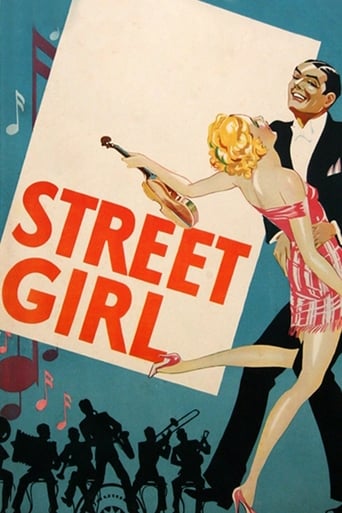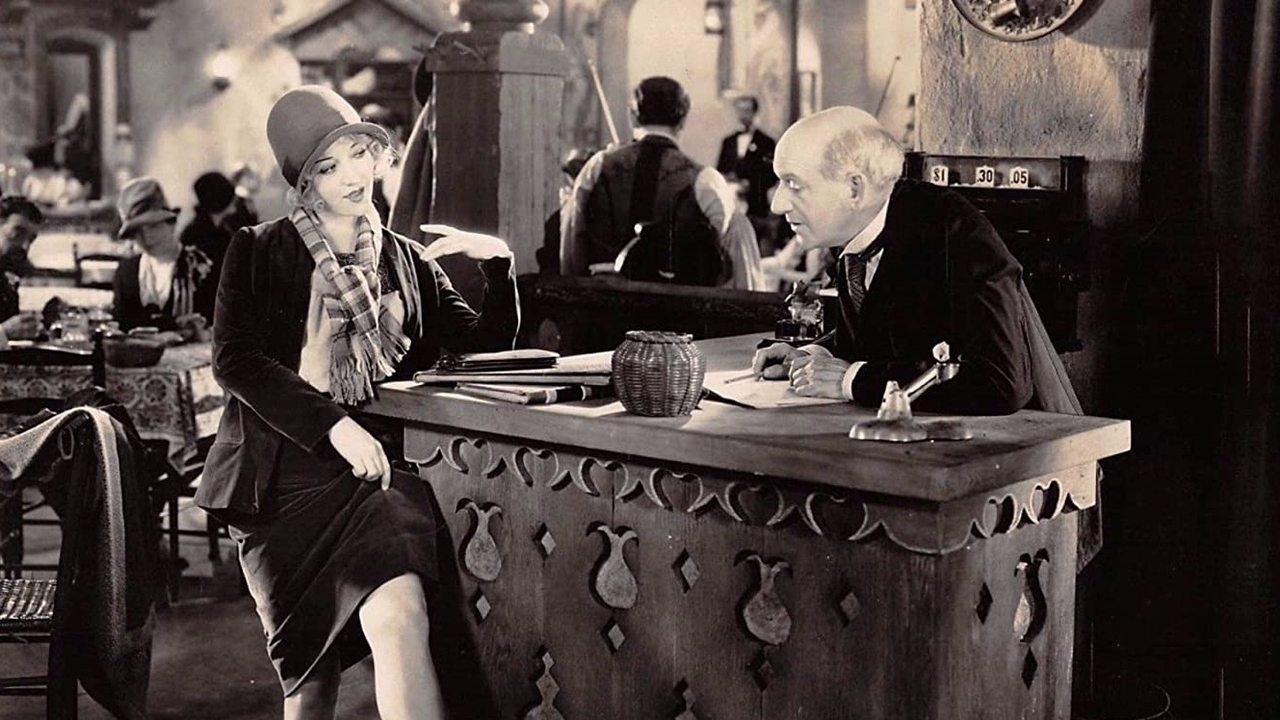Michael_Elliott
Street Girl (1929) ** 1/2 (out of 4)After finding herself homeless and hungry, Frederika (Betty Compson) is giving a place to stay by Mike Fall (John Harron), a band member who lives with his three other players. Frederika believes that the group could demand much more money because of their playing skills and soon she's working as their manager and the five start to rise in popularity but when a Prince starts to woo Frederika, this doesn't sit well with Mike.STREET GIRL was the first film ever produced by RKO, although it turned out to be the second that they'd actually release. For the most part this is a pretty good early talkie that manages to follow a pretty basic formula but thankfully the cast is so good that it makes up for the family story, which even by 1929 standards was pretty predictable. Of course, the majority of the credit has to go to Compson who easily steals the picture of the lovable blonde.Compson has the misfortune of having to speak with a silly accent that goes in and out throughout the picture but outside of this she's certainly a delight to watch. She manages to be incredibly lovable from the first moment we meet her and you just can't help but fall in love with her just like the four roommates do. Another good performance comes from Harron who manages to pull off that jealousy role quite well and we also get Jack Oakie in a supporting part. Ned Sparks is quite funny as "Happy," the person constantly thinking someone is cheating him.The story itself is quite predictable but the technical side of things are actually quite good for 1929. A lot of times these early talkies pretty much have the camera sitting still but that's not the case here as there's a little style on display here. There are some musical numbers throughout and all of them are quite good and it's worth noting that the violin playing is done by Compson herself. STREET GIRL certainly has its flaws but fans of the actress will certainly enjoy her work here and fans of early talkies should be impressed on a technical level.
magunning-630-962353
I watched this on TCM and found it interesting, though in many ways just a showcase for the music. Very '20s, very period-piece stuff, with the usual strange choreography. I thought the title Street Girl was a bit of a tease however, as the "girl" turned out to be a homeless violinist who gets involved with a down-at-heels dance band. What stood out for me however was the noisiness of the sound track, the worst I have ever heard. I realize this is an early talkie and they were probably still struggling with ways to muffle the sound of the camera. But every shot seemed to have its own peculiar frequency, from whirring to humming to grinding to something like a garburator. I wonder now if early-talkie audiences noticed or cared about this, but it seems to me that many must have longed for the sophisticated accompaniment that had evolved by late in the silent era. What also amazes me is the leap in sophistication that took place in only a couple of years: by 1931, people had forgotten all about silent movies and screenwriters/actors had hit their stride. This is great to watch if you're a sound technician/film historian or both.
calvinnme
Actually, this isn't much of a musical. Instead it is more of a movie about musicians. Four friends are trying to make it as a musical band when, one night, one member finds a girl being accosted by a fellow in the doorway of his apartment house. He gets rid of the masher and invites her in when he discovers she is hungry and homeless, and she quickly wins the other bandmembers/roommates over. First she takes to keeping house for them, then she graduates to promoting their careers, and does a pretty handy job of both. Of course, romance arises and complicates matters.Unlike most backstagers of this era, this one is refreshingly different. These five people are looking for happiness, not just fame and fortune. Their bond of friendship seems to have depth, and success doesn't really change them. The only bad things I can really say is - like another reviewer - Betty Compson really is saddled with a ridiculous accent in this one. Also, the movie is just too long. At 90 minutes some scenes could have been tightened up or even deleted, and it would have been a better paced film had it been about 15 minutes shorter.
mgconlan-1
I'll say quite a few good things about "Street Girl." The overall plot is serviceable, the songs by Oscar Levant and Sidney Clare are nice period pieces (Levant spent much of his life trying to play on the pop-songwriting turf of his good friend George Gershwin, and he wrote one truly great song — "Blame It on My Youth" — but Gershwin he wasn't), the big musical finale "Broken-Up Tune" is suitably spectacular (I suspect this number was originally in two-strip Technicolor even though it only survives in black-and-white, and in the print just shown on TCM there's one shot in the final sequence that is photographically quite inferior to the rest, suggesting that the film as it stands was pieced back together from partial prints), and above all Wesley Ruggles' direction, though hardly at the imaginative level of Mamoulian's, Capra's, Wyler's, Milestone's or Vidor's in their first talkies, is quite fluid. The camera moves around quite a lot, the editing is fast-paced and the actors speak relatively naturally without the seemingly endless pauses between lines (sometimes between words!) that make a lot of early talkies virtually unwatchable today.That's the good news. The bad news is the writer's dorky decision to change the origin of Betty Compson's character from a real country, Austria, to a fictitious one, "Aregon" (presumably not to be confused with the real Spanish province of Aragon); the awful accent Compson affects to sound suitably "Aregonese"; the casting of Jack Oakie without giving him any laughs (and he's utterly unable at any point to convince us he can actually play the clarinet); and a pretty sluggish pace despite all the camera movement and quick cutting. Also there's the obvious cheapness of using the same pre-recording of the song "Lovable and Sweet" all three times it's performed (you can tell because of the Beiderbecke-esquire "smear" John Harron's trumpet double performs in his solo each time). It ends up an O.K. movie but you get the impression it could have been better made a few years later — indeed it WAS made better on two separate occasions; "The Girl from Paris" isn't that great a movie either (though at least Lily Pons' accent is her real one!) but it's a damned sight better than this.


 AD
AD


